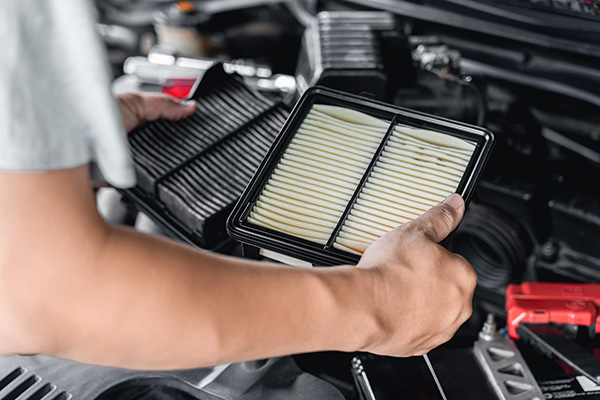
Your Mercedes-Benz is engineered to deliver smooth, powerful performance. Every system works together with precision, and even a small part like the engine air filter plays a critical role. The air filter makes sure that the air entering the engine is clean and free of dust, dirt, and debris. When it becomes clogged, the effects on performance, efficiency, and long-term reliability can be more serious than many drivers expect.
Here’s how a dirty air filter can impact your Mercedes-Benz and why replacing it on schedule is so important.
Why the Engine Air Filter Matters
Engines need a precise balance of air and fuel to run properly. The air filter allows oxygen to enter while blocking harmful contaminants that could damage the engine. Over time, the filter naturally becomes dirty as it traps debris. If it’s not replaced, the airflow into the engine becomes restricted. A restricted intake leads to reduced efficiency and puts extra stress on critical parts.
Reduced Acceleration and Power
One of the first symptoms of a clogged air filter is a noticeable drop in acceleration. If your Mercedes-Benz feels sluggish when you press the gas pedal, the engine may not be getting enough air to burn fuel efficiently. This lack of airflow forces the engine to work harder, and you may feel a delay in response or reduced power when merging onto highways or climbing hills.
Poor Fuel Economy
When air is restricted, the engine compensates by using more fuel to try to maintain performance. Over time, this imbalance can cause your fuel economy to drop. A clean air filter helps maintain the proper air-fuel mixture, keeping your Mercedes-Benz efficient even on long commutes or city drives.
Increased Engine Wear
Dirt and debris that bypass a clogged or damaged air filter can enter the engine and cause internal wear. Fine particles can damage cylinders, pistons, and valves, leading to costly repairs. Preventing this type of damage is one of the main reasons Mercedes-Benz emphasizes scheduled maintenance. Replacing the filter at recommended intervals helps protect the engine for the long run.
Rough Idling or Misfires
Engines that don’t receive enough air may idle roughly or misfire. You might feel vibrations when the car is stopped, or notice the engine running unevenly. In severe cases, a dirty air filter can cause the check engine light to come on. These issues not only affect comfort but also indicate the engine isn’t running as smoothly as it should.
Impact on Emissions
Restricted airflow changes the combustion process, which can increase exhaust emissions. If your air filter is clogged, your Mercedes-Benz may release more pollutants than usual. This can cause problems during emissions testing and may point to reduced overall efficiency.
How Often Should You Replace the Air Filter
Mercedes-Benz recommends air filter replacement intervals based on mileage and driving conditions. For most models, it’s around every 15,000 to 20,000 miles. However, if you often drive in dusty or polluted areas, you may need replacements more frequently. Checking the filter during routine service is the best way to stay on top of its condition.
Signs It’s Time for a New Filter
You don’t always need to rely on mileage alone. Signs that your filter may need replacement include:
- Reduced acceleration or sluggish performance
- Drop in fuel economy
- Dark or dirty filter material visible on inspection
- Rough idling or unusual engine noises
If you notice any of these, it’s worth scheduling a check before the problem affects performance further.
Mercedes-Benz Air Filter Service at Prestige Autohaus in Walnut Creek, CA
If you want your Mercedes-Benz to deliver the power and efficiency it was designed for, don’t overlook the air filter. At Prestige Autohaus in Walnut Creek, CA, our technicians will inspect and replace your air filter with the correct part for your vehicle. We’ll ensure your engine receives the clean air it needs to remain responsive, efficient, and reliable.
Schedule your service with us today and keep your Mercedes-Benz performing at its best.